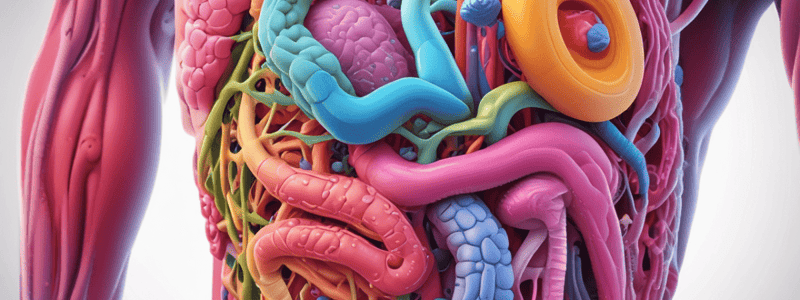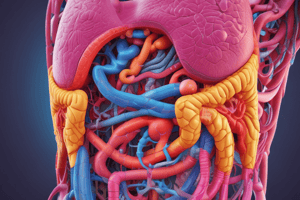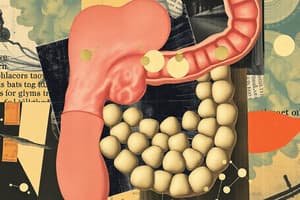Podcast
Questions and Answers
What is the primary function of mucus secreted by the alimentary tract? TWO ANSWERS
What is the primary function of mucus secreted by the alimentary tract? TWO ANSWERS
- To provide a protective barrier against acid and enzymes (correct)
- To lubricate the passage of food
- To facilitate absorption of nutrients
- To neutralize stomach acid
Which hormone is primarily responsible for stimulating gastric acid secretion?
Which hormone is primarily responsible for stimulating gastric acid secretion?
- Secretin
- Cholecystokinin (CCK)
- Gastrin (correct)
- Somatostatin
What is the primary function of the exocrine pancreas?
What is the primary function of the exocrine pancreas?
- To absorb nutrients
- To produce insulin
- To secrete digestive enzymes (correct)
- To secrete bile
Which of the following is NOT a component of bile secreted by the liver?
Which of the following is NOT a component of bile secreted by the liver?
What is the function of the tiny projections called villi and microvilli found on the folds of the small intestine?
What is the function of the tiny projections called villi and microvilli found on the folds of the small intestine?
What is the primary function of the small intestine secretions?
What is the primary function of the small intestine secretions?
What is the composition of mucus secreted by mucous glands onto the gut wall? TWO ANSWERS
What is the composition of mucus secreted by mucous glands onto the gut wall? TWO ANSWERS
Which is true about mucus and the gut wall?
Which is true about mucus and the gut wall?
Which condition is associated with a lack of intrinsic factor, leading to pernicious anemia?
Which condition is associated with a lack of intrinsic factor, leading to pernicious anemia?
What is the role of blood capillaries and lacteals in the small intestine?
What is the role of blood capillaries and lacteals in the small intestine?
How does mucus resist digestion by GI enzymes?
How does mucus resist digestion by GI enzymes?
What are the two main secretions in the alimentary tract?
What are the two main secretions in the alimentary tract?
Which glands secrete acid and pepsinogen in the stomach?
Which glands secrete acid and pepsinogen in the stomach?
What type of stimulation greatly increases glandular secretions in the alimentary tract?
What type of stimulation greatly increases glandular secretions in the alimentary tract?
How do GI hormones regulate the volume and composition of secretions?
How do GI hormones regulate the volume and composition of secretions?
How are GI hormones released into the body?
How are GI hormones released into the body?
What triggers exocytosis of glandular cell contents to the exterior?
What triggers exocytosis of glandular cell contents to the exterior?
What is the primary function of the serous secretion in saliva?
What is the primary function of the serous secretion in saliva?
Which salivary gland produces only serous secretion?
Which salivary gland produces only serous secretion?
What is the primary function of the mucus secretion in saliva?
What is the primary function of the mucus secretion in saliva?
Which nerve stimulates the parotid gland to secrete saliva?
Which nerve stimulates the parotid gland to secrete saliva?
What is the primary function of the esophageal secretions?
What is the primary function of the esophageal secretions?
Which of the following inhibits saliva secretion?
Which of the following inhibits saliva secretion?
Which enzyme is responsible for hydrolyzing fat for digestion?
Which enzyme is responsible for hydrolyzing fat for digestion?
What is the main function of the brush border enzyme enterokinase (enteropeptidase) in the pancreas?
What is the main function of the brush border enzyme enterokinase (enteropeptidase) in the pancreas?
Which hormone controls the secretion of pancreatic enzymes when food enters the small intestine?
Which hormone controls the secretion of pancreatic enzymes when food enters the small intestine?
What is the primary function of the biliary tree in the digestive system?
What is the primary function of the biliary tree in the digestive system?
Which enzyme prevents the activation of other pancreatic zymogens in the acinar cells?
Which enzyme prevents the activation of other pancreatic zymogens in the acinar cells?
In what part of the digestive system does secretin stimulate the secretion of bicarbonate ions from pancreas?
In what part of the digestive system does secretin stimulate the secretion of bicarbonate ions from pancreas?
What is the primary role of acetylcholine in regulating pancreatic secretion?
What is the primary role of acetylcholine in regulating pancreatic secretion?
Which structure surrounds the duct where combined bile and pancreatic secretions enter the duodenum?
Which structure surrounds the duct where combined bile and pancreatic secretions enter the duodenum?
'Alkaline tide' refers to a phenomenon that occurs due to the neutralization of which substance?
'Alkaline tide' refers to a phenomenon that occurs due to the neutralization of which substance?
The liver produces between 500-1000 ml of bile per day.
The liver produces between 500-1000 ml of bile per day.
Bile acids are enzymes that help in the digestion of fats.
Bile acids are enzymes that help in the digestion of fats.
The primary bile acids formed in the liver are cholic acid and chenodeoxycholic acid.
The primary bile acids formed in the liver are cholic acid and chenodeoxycholic acid.
In the enterohepatic circulation, 20% of bile salts are absorbed from the small intestine.
In the enterohepatic circulation, 20% of bile salts are absorbed from the small intestine.
Bile secretion occurs in a single stage.
Bile secretion occurs in a single stage.
The hormone cholecystokinin (CCK) stimulates the gallbladder to contract and release bile, especially with fatty foods.
The hormone cholecystokinin (CCK) stimulates the gallbladder to contract and release bile, especially with fatty foods.
Bile salts are formed in the gallbladder from cholesterol.
Bile salts are formed in the gallbladder from cholesterol.
Gallstones can form due to inflammation of the gallbladder epithelium, which changes the absorption of water and bile salts.
Gallstones can form due to inflammation of the gallbladder epithelium, which changes the absorption of water and bile salts.
The hormone secretin stimulates the secretion of hydrochloric acid from the liver.
The hormone secretin stimulates the secretion of hydrochloric acid from the liver.
Bile serves as a means of excretion for bilirubin and excess cholesterol.
Bile serves as a means of excretion for bilirubin and excess cholesterol.
Flashcards are hidden until you start studying




